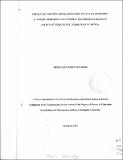| dc.description.abstract | There are several impediments to students' academic performance, among them parents' social economic status (SES) is thought to influence students' academic achievement. The purpose of this study was to find out the impact of social economic status on students' academic performance in public secondary schools in Kieni East Sub County, Nyeri County, Kenya. The study was guided by the following research objectives to examine the impact of: parents' level of income, parents' level of education, type of family of students and the academic support facilities in the homes on learners' academic performance in public secondary schools in Kieni East Sub County. The study was informed by the Socio-Cultural Theory of human learning propounded by Vygosky. The study adopted a descriptive survey research design. The target population for this study consisted of 9184 students in all the 28 public secondary schools in the sub county. Stratified random sampling was used to select 10% of the schools (3 schools). From each of the sampled schools, 33 form .three students were randomly selected making a total of 99 respondents. The pretesting of research instruments was done in one school that was not included in the final study. Validity was assured by careful choice of indicators in line with the objectives and consultation with the supervisors. Pearson product moment was used to determine the reliability of the questionnaire items and a coefficient of 0.817 was obtained. Data was collected by means of questionnaires administered to the students and interview guides administered to parents by phone. The data collected was cleaned, coded and analyzed by use of descriptive statistics with the aid of SPSS version 20.0 and qualitative data was analyzed by content analysis. The findings are presented in form of tables, bar charts and pie charts. The study established that the more the number of family members were in formal employment the higher the learners academic performance. The parents' level of education was therefore established as a determinant to the students' academic performance. The study established that the type of family structure had an impact on learners' academic performance. The findings revealed that in homes lacking academic support facilities, the academic performance of learners was poor. Multiple regression analysis carried out on combined relationship between the independent variables (family income, parents' level of education and educational support facilities) and academic performance showed that the value of R2 =0.387impying that 38.7% of the academic performance variation was due to joint variation in the independent variables tested. Independently, regression analysis established that academic performance among the learners in the study population could be accounted for by 8.1 % variations in family income, 18.8% of variations in parents' level of education and 21.4% of variations in educational support facilities in the homes of the respondents. Based on the findings the study recommends that county and central governments to put in place measures that can help alleviate the poverty evident in the sub county. Secondly, measures should be put in place to encourage parents: in the sub county to enroll for adult education classes. Thirdly, families with children- in schools need to be sensitized on proper parenting skills. Finally, parents need to be sensitized on the need to maintain an academically supportive environment in the homes. | en_US |


